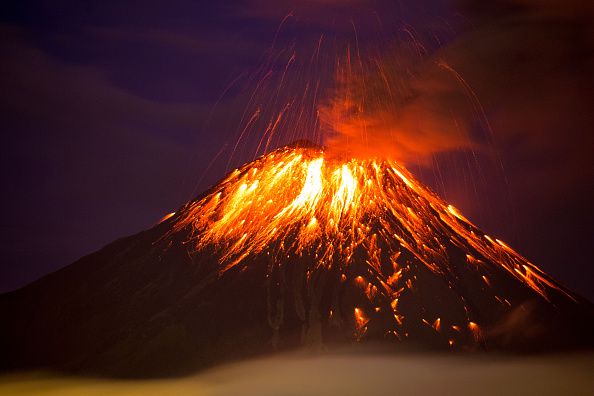
Is New England about to blow? A rising blob of hot rock recently detected under Vermont suggests the region might not be as stable as scientists once thought.
Scientists from Rutgers University found evidence that heated rock is swelling underneath the Appalachian mountains—which could mean a new volcano is forming. The rising blob is the smaller and slower cousin of magma pockets that geologists have observed under well-established volcanoes, according to National Geographic. The research was published in a new paper in the scientific journal Geology.
Fortunately any such volcano will not blow any time soon. The researchers collected the data using the National Science Foundation's EarthScope program, which monitors the North American continent for seismic activity. If the data prove accurate, geologists are going to have to re-evaluate a few things—maybe New England isn't as stable as everyone assumed after all.
"Our study challenges the established notion of how the continents on which we live behave," lead author Vadim Levin of Rutgers's Department of Earth and Planetary Sciences told Rutgers University. "It challenges the textbook concepts taught in introductory geology classes."
There may be a volcano forming under New England, scientists warn https://t.co/wOTDqHy7xx pic.twitter.com/SO9H5HHS3E
— BGR.com (@BGR) December 19, 2017
The upwelling appears to be particularly concentrated underneath central Vermont and western New Hampshire, and to a lesser degree underneath western Massachusetts. It's possible that the seismic activity is present in other locations as well, but researchers don't yet have the data to be able to say for sure.
"The upwelling we detected is like a hot air balloon, and we infer that something is rising up through the deeper part of our planet under New England," Levin told Rutgers. "It is not Yellowstone (National Park)-like, but it's a distant relative in the sense that something relatively small–no more than a couple hundred miles across–is happening."
Levin told Rutgers that any volcanic eruption likely wouldn't happen for millions of years. But the discovery is nonetheless striking; New England isn't known for any kind of seismic activity, especially not dangerous seismic activity, as news site BGR reported.
"We're interested in what happens at the interface between tectonic plates–thick, solid parts that cover our planet–and material in the upper mantle beneath the plates," Levin told Rutgers University. "We want to see how North America is gliding over the deeper parts of our planet. It is a very large and relatively stable region, but we found an irregular pattern with rather abrupt changes in it."
For a period of nearly 200 million years, Levin told Rutgers, North America's Atlantic margin didn't experience any seismic activity of consequence, which has resulted in what the researchers call a "passive margin." This refers to an area where the absense of geological activity has resulted in a gradual, steady loss of heat, which can be accelerated by wind and water erosion on the surface. Because of that heat loss, Levin and his colleagues didn't expect to discover any sudden changes in the region. Which means, according to Levin, that "the likely explanation points to a much more dynamic regime underneath this old, geologically quiet area."
The next step for the researchers is to figure out exactly how that happened. Since we have a few million years for the upwelling to come to a head, though, they're not in any particular rush.
SaveSave
Uncommon Knowledge
Newsweek is committed to challenging conventional wisdom and finding connections in the search for common ground.
Newsweek is committed to challenging conventional wisdom and finding connections in the search for common ground.
About the writer
Kastalia Medrano is a Manhattan-based journalist whose writing has appeared at outlets like Pacific Standard, VICE, National Geographic, the Paris Review Daily, ... Read more
To read how Newsweek uses AI as a newsroom tool, Click here.








